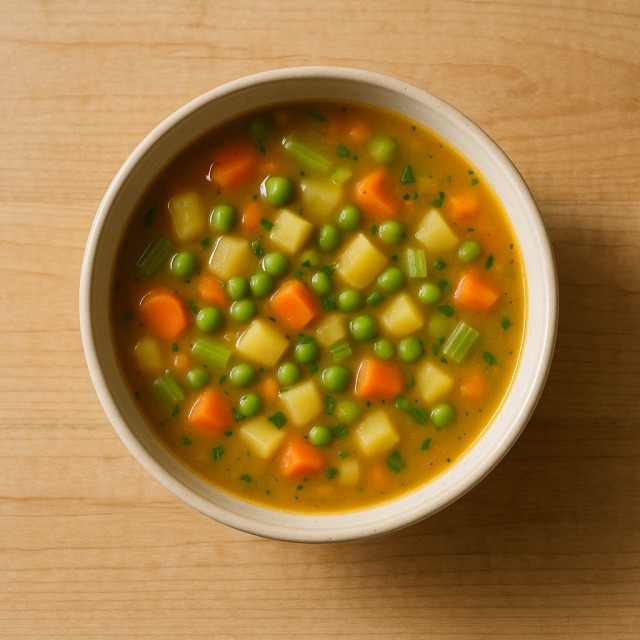Calorie Chart / Vegetables / Celeriac
How Many Calories Are in Celeriac?
Calculation of the nutritional value & Recommended Dietary Intake of celeriac
For g and a calorie requirement of kcal
| Calories 66 kcal | Proteins 3 g | Lipids 0.3 g | Carbohydrates 13 g |
| 3% | 4% | 0% | 5% |
Health benefits of celeriac

Celeriac - 100g
Calories 44 kcal
Proteins 2 g
Lipids 0.2 g
Carbohydrates 8.5 g
Celeriac is considered a low-calorie root vegetable: its 44 kcal per 100 g make it an obvious choice for anyone typing "celeriac calories" or comparing calories between starchy side dishes. Because it delivers flavour and fibre without many calories, it is popular in weight-management plans and in sports nutrition when athletes want volume without excessive calories.
Beyond its modest calorie content, celeriac provides vitamin K (good for blood clotting and bone health), vitamin C, vitamin B6 and a notable amount of potassium and phosphorus. Its dietary fibre helps regulate blood-sugar peaks, another indirect benefit for those monitoring calories. The root also contains antioxidant compounds such as apigenin and coumarins; their anti-inflammatory effect is still "supposed" rather than fully proven, yet they add to celeriac's reputation as a tonic vegetable.
Historically cultivated around the Mediterranean since antiquity, celeriac was appreciated in Renaissance Europe for its aromatic notes that mimic celery while contributing fewer calories than most tubers. In French cuisine, it often replaces potato in purées when chefs need a silky texture with lighter calories. Its rough exterior hides a white flesh that resists oxidation better if sprinkled with lemon juice.
Tips for incorporating celeriac into a balanced diet
To keep calories low, enjoy raw grated celeriac in a homemade light yogurt dressing: think of it as a slimmer version of celeriac remoulade. If you crave comfort food, mash cooked celeriac with a spoon of light crème fraîche; the result has far fewer calories than a classic mashed potato yet remains creamy.
For a balanced dinner, roast celeriac cubes with thyme and serve them alongside a grilled chicken breast. The lean proteins pair with the vegetable's low calories, helping you hit post-workout macros without blowing your daily calorie budget.
Another idea is to cut the root into "steaks," brush with olive oil and bake until golden; top with a fillet of omega-3-rich salmon and some steamed broccoli. This plate supplies high-quality proteins, good fats and plenty of micronutrients while keeping total calories moderate.
Finally, celeriac cubes add body to winter soups such as a mixed-vegetable potage with carrot and leek. Blending celeriac thickens the broth without resorting to cream, so you cut back on calories yet gain satiety.
Frequently Asked Questions
- How many calories are in celeriac?
- There are 44 kcal per 100 g.
- Is celeriac good for weight-loss diets focused on calories?
- Yes. Its low 44 kcal density and high fibre make it filling, so you can increase plate volume while keeping calories in check.
- Does celeriac have fewer calories than potato?
- On average, potato provides around 80–90 kcal per 100 g, roughly double the calories of celeriac, so swapping cuts a significant number of calories.
- What is the best cooking method to keep celeriac calories lowest?
- Steaming or roasting with minimal oil preserves nutrients and adds virtually no extra calories; frying or creamy gratins will raise calories quickly.
- Can athletes use celeriac to balance macros and calories?
- Absolutely. Pairing celeriac with lean protein such as a turkey cutlet allows control of calories while still meeting protein targets and supplying potassium for muscle function.
- Is celeriac keto-friendly in terms of calories and carbs?
- With about 8.5 g of carbohydrates and 44 kcal per 100 g, it fits a moderate-carb plan but may be borderline for strict keto; however, its calories remain low compared with many root vegetables.
Similar foods
Information provided by Calorie Menu may contain inaccuracies or errors. It cannot, under any circumstances, substitute medical advice or medication.










